初二英语语法一般过去时及练习题
- 格式:doc
- 大小:74.00 KB
- 文档页数:9
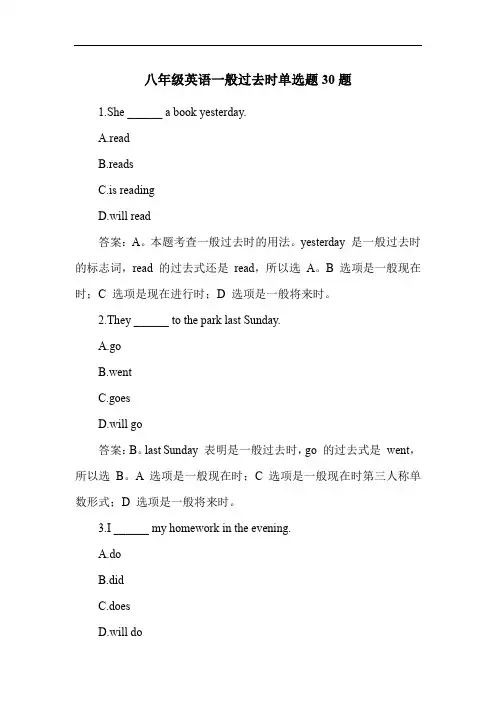
八年级英语一般过去时单选题30题1.She ______ a book yesterday.A.readB.readsC.is readingD.will read答案:A。
本题考查一般过去时的用法。
yesterday 是一般过去时的标志词,read 的过去式还是read,所以选A。
B 选项是一般现在时;C 选项是现在进行时;D 选项是一般将来时。
2.They ______ to the park last Sunday.A.goB.wentC.goesD.will go答案:B。
last Sunday 表明是一般过去时,go 的过去式是went,所以选B。
A 选项是一般现在时;C 选项是一般现在时第三人称单数形式;D 选项是一般将来时。
3.I ______ my homework in the evening.A.doB.didC.doesD.will do答案:B。
没有具体的时间标志词,但可以根据语境判断是过去发生的事情,do 的过去式是did,所以选B。
A 选项是一般现在时;C 选项是一般现在时第三人称单数形式;D 选项是一般将来时。
4.He ______ basketball with his friends yesterday afternoon.A.playB.playedC.playsD.will play答案:B。
yesterday afternoon 是一般过去时的标志词,play 的过去式是played,所以选B。
A 选项是一般现在时;C 选项是一般现在时第三人称单数形式;D 选项是一般将来时。
5.We ______ a movie last weekend.A.seeB.sawC.seesD.will see答案:B。
last weekend 是一般过去时的标志词,see 的过去式是saw,所以选B。
A 选项是一般现在时;C 选项是一般现在时第三人称单数形式;D 选项是一般将来时。
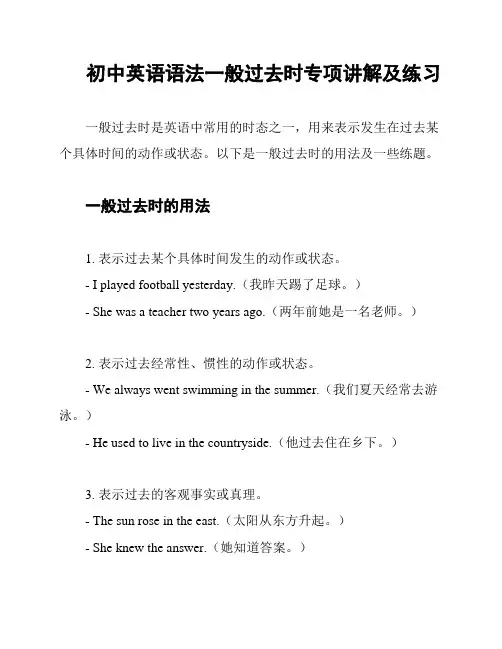
初中英语语法一般过去时专项讲解及练习一般过去时是英语中常用的时态之一,用来表示发生在过去某个具体时间的动作或状态。
以下是一般过去时的用法及一些练题。
一般过去时的用法1. 表示过去某个具体时间发生的动作或状态。
- I played football yesterday.(我昨天踢了足球。
)- She was a teacher two years ago.(两年前她是一名老师。
)2. 表示过去经常性、惯性的动作或状态。
- We always went swimming in the summer.(我们夏天经常去游泳。
)- He used to live in the countryside.(他过去住在乡下。
)3. 表示过去的客观事实或真理。
- The sun rose in the east.(太阳从东方升起。
)- She knew the answer.(她知道答案。
)一般过去时练题请根据句子的意思,在括号中填上适当的动词的过去式。
1. My friend __________ (visit) me last week.(我朋友上个星期来看我。
)2. They __________ (watch) a movie yesterday evening.(他们昨晚看了一部电影。
)3. Helen and I __________ (play) tennis together when we were children.(海伦和我小时候一起打网球。
)4. He __________ (not go) to school yesterday because he was sick.(他昨天因为生病没去上学。
)5. We __________ (live) in that house for five years before we moved.(我们在那个房子住了五年才搬走。
)总结一般过去时用于表示过去某个具体时间发生的动作或状态,过去的经常性、习惯性动作或状态,以及客观事实或真理。
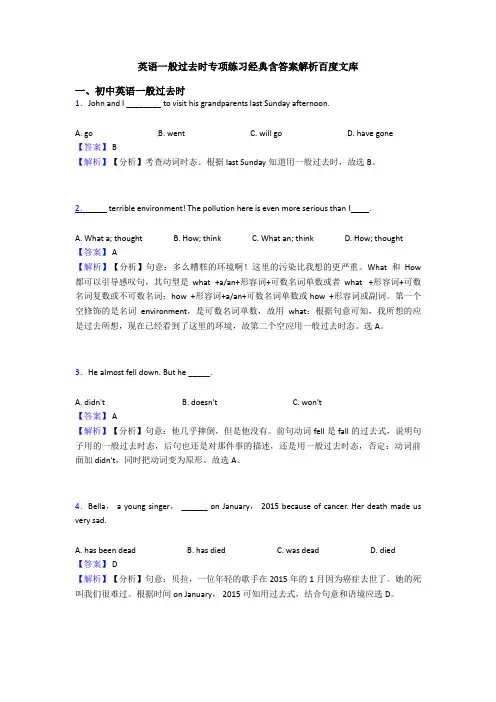
英语一般过去时专项练习经典含答案解析百度文库一、初中英语一般过去时1.John and I ________ to visit his grandparents last Sunday afternoon.A. goB. wentC. will goD. have gone【答案】 B【解析】【分析】考查动词时态。
根据last Sunday知道用一般过去时,故选B。
2. __ terrible environment! The pollution here is even more serious than I __ .A. What a; thoughtB. How; thinkC. What an; thinkD. How; thought【答案】 A【解析】【分析】句意:多么糟糕的环境啊!这里的污染比我想的更严重。
What 和How 都可以引导感叹句,其句型是what +a/an+形容词+可数名词单数或者what +形容词+可数名词复数或不可数名词;how +形容词+a/an+可数名词单数或how +形容词或副词。
第一个空修饰的是名词environment,是可数名词单数,故用what;根据句意可知,我所想的应是过去所想,现在已经看到了这里的环境,故第二个空应用一般过去时态。
选A。
3.He almost fell down. But he _____.A. didn'tB. doesn'tC. won't【答案】 A【解析】【分析】句意:他几乎摔倒,但是他没有。
前句动词fell是fall的过去式,说明句子用的一般过去时态,后句也还是对那件事的描述,还是用一般过去时态,否定:动词前面加didn't,同时把动词变为原形。
故选A。
4.Bella, a young singer, ______ on January, 2015 because of cancer. Her death made us very sad.A. has been deadB. has diedC. was deadD. died【答案】 D【解析】【分析】句意:贝拉,一位年轻的歌手在2015年的1月因为癌症去世了。
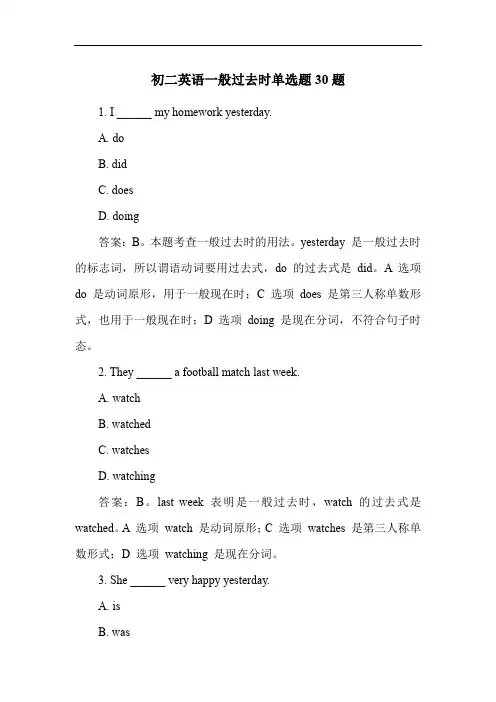
初二英语一般过去时单选题30题1. I ______ my homework yesterday.A. doB. didC. doesD. doing答案:B。
本题考查一般过去时的用法。
yesterday 是一般过去时的标志词,所以谓语动词要用过去式,do 的过去式是did。
A 选项do 是动词原形,用于一般现在时;C 选项does 是第三人称单数形式,也用于一般现在时;D 选项doing 是现在分词,不符合句子时态。
2. They ______ a football match last week.A. watchB. watchedC. watchesD. watching答案:B。
last week 表明是一般过去时,watch 的过去式是watched。
A 选项watch 是动词原形;C 选项watches 是第三人称单数形式;D 选项watching 是现在分词。
3. She ______ very happy yesterday.A. isB. wasD. were答案:B。
yesterday 提示一般过去时,主语she 是第三人称单数,be 动词用was。
A 选项is 用于一般现在时;C 选项are 用于复数主语;D 选项were 用于复数主语的一般过去时。
4. We ______ to the zoo last month.A. goB. wentC. goesD. going答案:B。
last month 是一般过去时的标志,go 的过去式是went。
A 选项go 是动词原形;C 选项goes 是第三人称单数形式;D 选项going 是现在分词。
5. He ______ ill last Tuesday.A. isB. wasC. areD. were答案:B。
last Tuesday 表明用一般过去时,主语he 是第三人称单数,be 动词用was。
A 选项is 用于一般现在时;C 选项are 用于复数主语;D 选项were 用于复数主语的一般过去时。
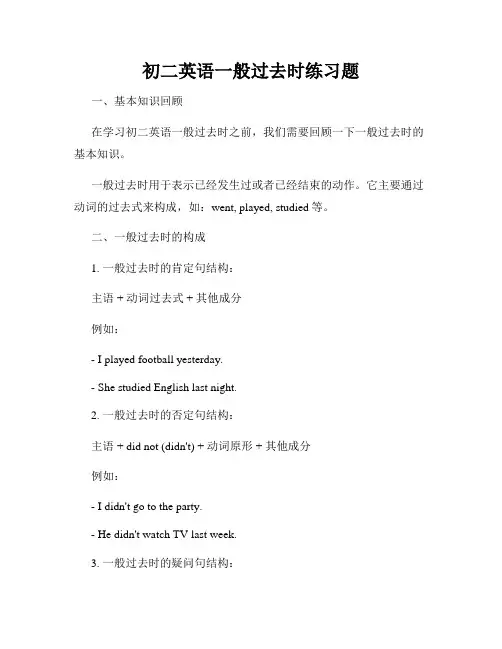
初二英语一般过去时练习题一、基本知识回顾在学习初二英语一般过去时之前,我们需要回顾一下一般过去时的基本知识。
一般过去时用于表示已经发生过或者已经结束的动作。
它主要通过动词的过去式来构成,如:went, played, studied等。
二、一般过去时的构成1. 一般过去时的肯定句结构:主语 + 动词过去式 + 其他成分例如:- I played football yesterday.- She studied English last night.2. 一般过去时的否定句结构:主语 + did not (didn't) + 动词原形 + 其他成分例如:- I didn't go to the party.- He didn't watch TV last week.3. 一般过去时的疑问句结构:Did + 主语 + 动词原形 + 其他成分?例如:- Did you visit your grandparents?- Did they eat lunch at the restaurant?三、一般过去时的用法1. 表示过去的经历、经验或者事件:- We visited the museum yesterday.- He lived in Paris when he was young.2. 表示过去的习惯或者常态:- She always played the piano after school.- We usually went to the park on weekends. 3. 用于时间和条件从句中:- If it rained, we stayed at home.- When I was a child, I loved to play with toys.四、一般过去时的练习题1. 选择正确的动词形式填空。
a) Yesterday, she (go/gone) to the beach.b) We (watched/watch) a movie last night.c) He (played/play) soccer with his friends on Saturday.d) They (visited/visit) their grandparents during the summer vacation.2. 改写下列句子,使用一般过去时。
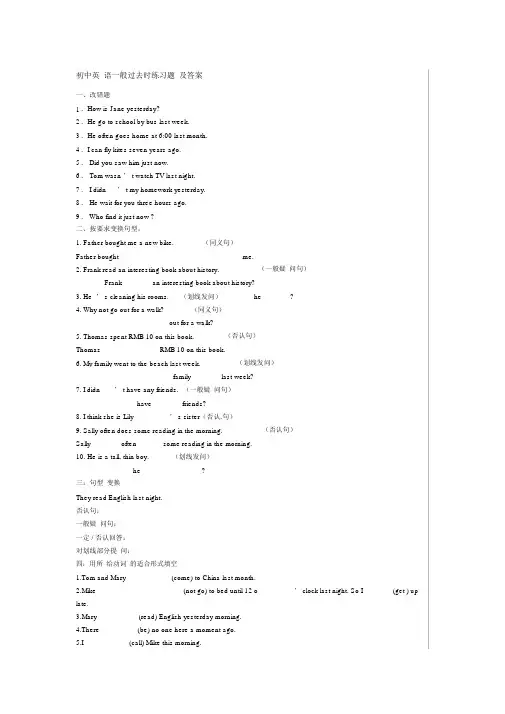
初中英语一般过去时练习题及答案一、改错题1.How is Jane yesterday? _____________________2.He go to school by bus last week. ____________________________3.He often goes home at 6:00 last month. ____________________________4.I can fly kites seven years ago. ______________________________5. Did you saw him just now. ____________________________________6. Tom wasn ’ t watch TV last night. ____________________________________7. I didn’ t my homework yesterday. ____________________________________8. He wait for you three hours ago. ____________________________________9. Who find it just now ? ________________________________________二、按要求变换句型。
1.Father bought me a new bike.(同义句)Father bought _______ _______ ________ ________ me.2.Frank read an interesting book about history.(一般疑问句)_______ Frank _______ an interesting book about history?3.He ’ s cleaning his rooms.(划线发问)________ he _______?4.Why not go out for a walk?(同义句)_______ ________ ________ out for a walk?5.Thomas spent RMB 10 on this book.(否认句)Thomas _______ _______ RMB 10 on this book.6.My family went to the beach last week.(划线发问)________ ________ ________ family _______ last week?7.I didn’ t have any friends.(一般疑问句)________ _______ have _______ friends?8.I think she is Lily’ s sister(否认.句) ____________________9.Sally often does some reading in the morning.(否认句)Sally _______ often ______ some reading in the morning.10. He is a tall, thin boy.(划线发问)_______ _______ he _______ ________?三:句型变换They read English last night.否认句: __________________________________________一般疑问句: ________________________________________一定 / 否认回答: ____________________________________对划线部分提问: ____________________________________四:用所给动词的适合形式填空1.Tom and Mary ___________ (come) to China last month.2.Mike _________________(not go) to bed until 12 o’ clock last night. So I _______ (get ) up late.3.Mary __________ (read) English yesterday morning.4.There _________ (be) no one here a moment ago.5.I ___________ (call) Mike this morning.6.I listened but ___________ (hear) nothing.7.Tom ___________ (begin) to learn Chinese last year.st week we _________ (pick) many apples on the farm.9.My mother ________________ (not do) housework yesterday.10.She watches TV every evening. But she _______________ (not watch) TV last night.11.________ your father ________ ( go ) to work every day last year?12.—What time _______ you _______ (get) to Beijing yesterday?—We __________ (get) to Beijing at 9:00 in the evening.13.What __________ (make) him cry (哭) just now?st year the teacher ___________ (tell) us that the earth moves around the sun.15.There ____________ a telephone call for you just now. (be)16.There __________ not enough people to pick apples that day. ( be)17.There _____________ any hospitals (医院) in my hometown (家乡) in 1940. ( be not)18.There ____________ enough milk at home last week, wasn’ t there?19.Eli ____________ to Japan last week. ( move)20.–When _______ you _________ (come) to China? - Lastyear. 21.Did she ________ (have) supper at home?22.Jack ____________ (not clean) the room just now.23._________ (be) it cold in your city yesterday?24.How many people ________ (be) there in your class last term?25.It ________ (be) hot yesterday and most children _______ (be) outside.26.There ________ (be) a football match on TV yesterday evening, but I _________ (have)no time to watch it.27.He ate some bread and _________ (drink) some milk.28.________ he __________ (finish) his homework last night?29.I__________(be) tired yesterday.30.I ___________(gain ) Arts degree last year.。
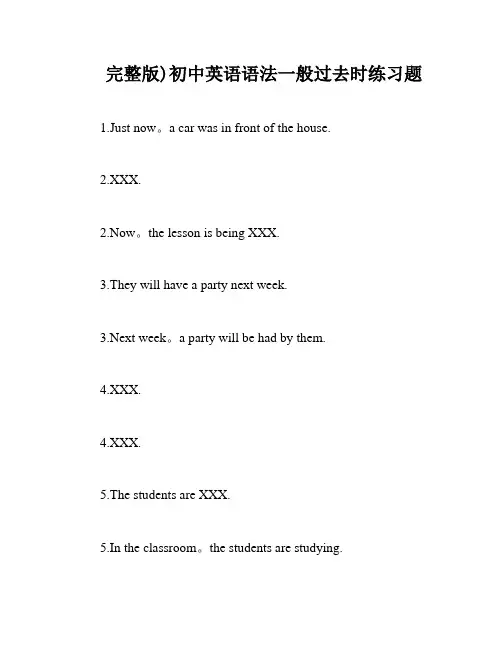
完整版)初中英语语法一般过去时练习题1.Just now。
a car was in front of the house.2.XXX.2.Now。
the lesson is being XXX.3.They will have a party next week.3.Next week。
a party will be had by them.4.XXX.4.XXX.5.The students are XXX.5.In the classroom。
the students are studying.6.He is going to visit his grandparents XXX.6.Next month。
his grandparents are going to be visited by him.7.XXX hours.7.Basketball has been played by them for two hours.8.The cat chased the mouse around the house.8.Around the house。
the mouse was chased by the cat.1.XXX.否定句:XXX.一般疑问句:Did they play football in the playground?肯定回答:Yes。
they did.否定回答:No。
they XXX't.改写后。
A group of people played XXX.2.XXX.否定句:XXX.一般疑问句:Did they play football in the playground?肯定回答:Yes。
they did.否定回答:No。
they XXX't.改写后。
A group of people enjoyed a game of football on the playground.四、用所给动词的适当形式填空1.I watched (watch) XXX.2.Her father read (read) a XXX.3.We went (go) to the zoo yesterday。
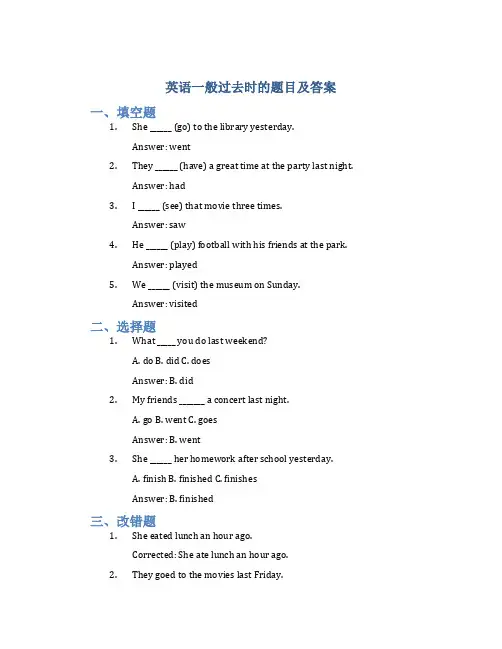
英语一般过去时的题目及答案一、填空题1.She ______ (go) to the library yesterday.Answer: went2.They ______ (have) a great time at the party last night.Answer: had3.I ______ (see) that movie three times.Answer: saw4.He ______ (play) football with his friends at the park.Answer: played5.We ______ (visit) the museum on Sunday.Answer: visited二、选择题1.What _____ you do last weekend?A. doB. didC. doesAnswer: B. did2.My friends _______ a concert last night.A. goB. wentC. goesAnswer: B. went3.She ______ her homework after school yesterday.A. finishB. finishedC. finishesAnswer: B. finished三、改错题1.She eated lunch an hour ago.Corrected: She ate lunch an hour ago.2.They goed to the movies last Friday.Corrected: They went to the movies last Friday.3.He talk to the teacher after class.Corrected: He talked to the teacher after class.四、连线题Match the past form of the verbs with their base form:1.eat A. wrote2.run B. drank3.find C. ran4.write D. ate5.drink E. foundAnswers: 1 - D, 2 - C, 3 - E, 4 - A, 5 - B五、现在完成时和一般过去时比较Explain the difference between the Present Perfect and Simple Past tense using the following example:。
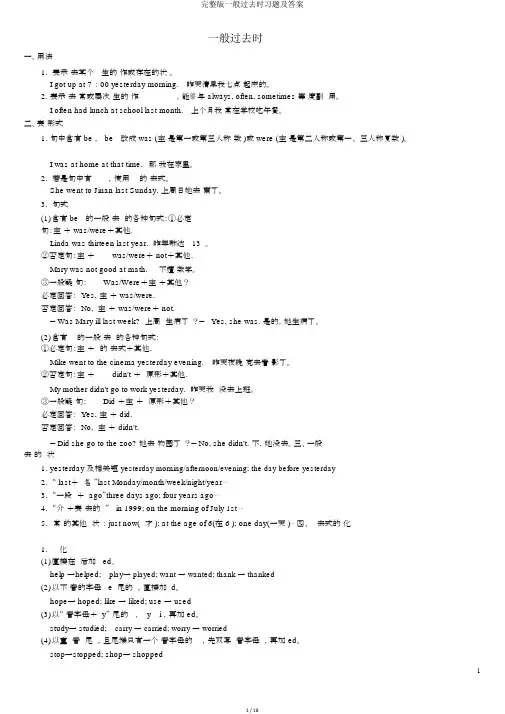
一般过去时一、用法1.表示去某个生的作或存在的状。
I got up at 7 : 00 yesterday morning.昨天清早我七点起床的。
2. 表示去常或屡次生的作,能够与always, often, sometimes等度副用。
I often had lunch at school last month.上个月我常在学校吃午餐。
二、表形式1. 句中含有 be , be 改成 was (主是第一或第三人称数 )或 were (主是第二人称或第一、三人称复数 )。
I was at home at that time.那我在家里。
2.若是句中有,使用的去式。
She went to Jinan last Sunday. 上周日她去南了。
3.句式(1)含有 be 的一般去的各种句式:①必定句:主+ was/were+其他.Linda was thirteen last year. 昨年琳达13 。
②否定句:主+was/were+ not+其他.Mary was not good at math.不擅数学。
③一般疑句:Was/Were+主+其他?必定回答: Yes, 主+ was/were.否定回答: No, 主+ was/were+ not.— Was Mary ill last week? 上周生病了?— Yes, she was. 是的,她生病了。
(2)含有的一般去的各种句式:①必定句:主+的去式+其他.Mike went to the cinema yesterday evening.昨天夜晚克去看影了。
②否定句:主+didn't +原形+其他.My mother didn't go to work yesterday. 昨天我没去上班。
③一般疑句:Did +主+原形+其他?必定回答: Yes, 主+ did.否定回答: No, 主+ didn't.— Did she go to the zoo? 她去物园了?— No, she didn't. 不,她没去。

初中一般过去时练习题及答案最新初中一般过去时练题及答案一、单项选择一般过去时1.XXX had intended to go bungee jumping, but on second thoughts, she _____ the plan.A.was cancelingC.canceled【答案】C【解析】【详解】考查动词时态。
句意:XXX本打算去蹦极的,然后她想了想,又取消了该计划。
由前半句“had XXX”可知前半句的时态为过去完成时,表示过去的过去,因此后半句为一般过去时,表示“取消计划”这一动作发生在“打算去蹦极”之后。
故正确答案为C。
B.cancelsD.has canceled2.--I XXX.--XXX, XXX a lot to my today’s work.A.serveC.had XXX【答案】D【剖析】试题分析:考查时态。
根据句意,做服务员是过去发生的事,因此才说对现在销售员的工作产生很多帮助,用过去式即可,句意:我想知道什么使你成为一个好的销售员。
我当服务员三年,这对我现在的工作很有帮助。
故选D考点:考查时态B.have XXXD.served3.XXX ________ in the shape of birds.A.design B.had designedC.XXX designed【谜底】C【剖析】考查时态和语态。
句意:在古代中国的鹞子被设计成鸟的形状。
按照in ancienttimes可知,句子用普通曩昔时态,按照动词与主语是被动干系,故用普通曩昔时的被动语态,故选C。
4.—Where was I?—You ________ you didn’t like your job.A.had said B.saidC.were saying D.has said【答案】B【解析】考查动词的时态。
句意:——我说到哪里?——你说到你不喜欢你的工作。
结合语境可知,下文描述的是过去的刚刚发生的动作,故用过去时态。
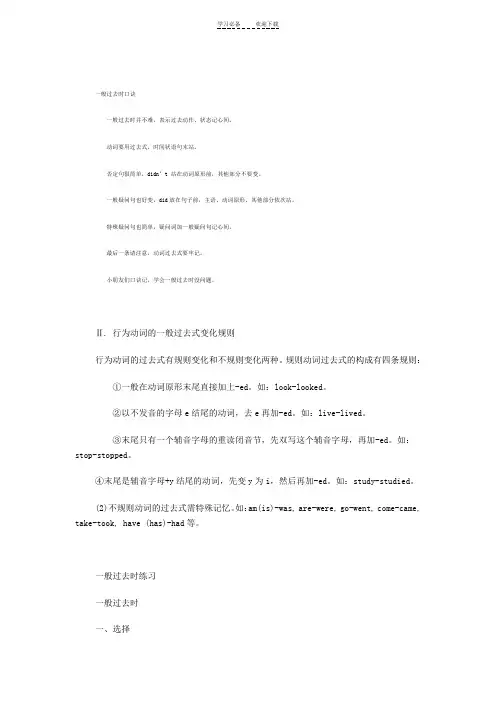
一般过去时口诀一般过去时并不难,表示过去动作、状态记心间。
动词要用过去式,时间状语句末站。
否定句很简单,didn’t 站在动词原形前,其他部分不要变。
一般疑问句也好变,did放在句子前,主语、动词原形、其他部分依次站。
特殊疑问句也简单,疑问词加一般疑问句记心间。
最后一条请注意,动词过去式要牢记。
小朋友们口诀记,学会一般过去时没问题。
Ⅱ. 行为动词的一般过去式变化规则行为动词的过去式有规则变化和不规则变化两种。
规则动词过去式的构成有四条规则:①一般在动词原形末尾直接加上-ed。
如:look-looked。
②以不发音的字母e结尾的动词,去e再加-ed。
如:live-lived。
③末尾只有一个辅音字母的重读闭音节,先双写这个辅音字母,再加-ed。
如:stop-stopped。
④末尾是辅音字母+y结尾的动词,先变y为i,然后再加-ed。
如:study-studied。
(2)不规则动词的过去式需特殊记忆。
如:am(is)-was, are-were, go-went, come-came, take-took, have (has)-had等。
一般过去时练习一般过去时一、选择( ) 1. What _____they _____dinner yesterday ?A. do; have forB. did; had forC. did; have forD. were; have for( ) 2. One of us ______band last month.A. leavesB. leaveC. leavedD. left( )3. I stayed in the sitting room and ____my friends all the time.A. talk toB. talkedC. talk aboutD. talked to( )4. I went to see you last Saturday, ____there ____nobody in the room.A. but; wasB. and; wereC. and; wasD. but; is二、用所给词的适当形式填空3. My father________ (buy) a new computer for________ (I ) yesterday.4. He often ______ (go) to school by bike, but last year heoften _________ (walk) to school.5. After she finished _______ (pack) everything, she ________(go) to bed.6. ---- Who______(wash) the plates on the table ?---- Jenny did.7. ---- When _______ you_____ (see ) the film “ Titanic”?8. It’s half past eleven now. Jim_____(have) lunch. He usually______(have) it at this time.9. She ______(write) to Jill last month. She _________(write) to him next time.10. The students ________ (stop) talking when their teacher came up.三、单句改错:下面每句均有一处错误,指出并加以改正1. Did you found the answer to thisquestion?2. Mary and her brother was born on the sameday.3. We start this lesson about ten minutesago.4. She hadn’t anything for breakfast this morning.5. They came here for ayear.6. Amy singed a song for us at thatparty.7. He said he will help me with my English when he was free.8. The man saw the bag until it waslate.一、. 句型转换1. The children had a good time in the park.否定句:__________________________________________一般疑问句:________________________________________对划线部分提问:____________________________________2. There were about nine hundred people at the concert.(音乐会) 否定句:__________________________________________一般疑问句:________________________________________对划线部分提问:____________________________________3. There was only one problem.否定句:__________________________________________一般疑问句:________________________________________肯定/否定回答:____________________________________4. Ann did her homework yesterday evening.否定句:__________________________________________一般疑问句:________________________________________对划线部分提问:____________________________________5. Last week I read an English book.否定句:__________________________________________一般疑问句:________________________________________肯定/否定回答:____________________________________对划线部分提问:____________________________________二、写出下列动词的三单现、过去式和现在分词go ______ _______ _______ enjoy _______ _______ ________buy ______ ______ _______ eat______ _______ _______get _______ _______ _______ walk ________ _______ ________take______ ______ ______ dance_______ ________ _______write _______ ______ ______ run______ _______ _______swim_______ _______ _______ find _______ _______ _______begin______ ______ ______ eat ______ _______ ______play ______ ______ _______ study ______ ______ ________三. 用所给词的适当形式填空。
英语一般过去时专项训练100(附答案)一、初中英语一般过去时1.I _______ along the road when I saw Peter. So we stopped and had a chat.A. walkedB. was walkingC. would walkD. had walked【答案】 B【解析】【分析】句意:“当我看见彼得时我正在沿着马路走。
连词when意为“当……的时候”引导时间状语从句,从句用一般过去时,主句用过去进行时,表示当某一表示过去的动作发生时,另一动作正在进行。
故选B。
【点评】考查动词时态用法。
2.—My car ________ yesterday. Could you please give me a ride tomorrow?—I'm sorry I can't, I'm ________ Dalian tomorrow morning.A. breaks down; flying atB. has broken down; flying atC. broke down; flying toD. had broken down; flying to【答案】 C【解析】【分析】句意:——我的车坏了,你明天能搭我一程吗?——对不起我不能,我明天早上要坐飞机去大连。
break down,出毛病,出故障,根据yesterday,可知用一般过去时,break的过去式是broke,根据tomorrow morning,可知用一般将来时,一些表示移动的动词可以用be+doing,表将来时,故选C。
【点评】考查动词的时态。
注意根据时间状语确定动词时态。
3.Everyone except Tom and John there when the meeting began.A. areB. isC. wereD. was【答案】 D【解析】【分析】句意:当会议开始的时候,除了Tom和John没来,每个人都在这。
一般过去时1.一般过去时表示在过去某一时间发生的动作或存在的状态表示时间的词有:yesterday,this morning/afternoon/evening,last+时间(上个...)last night,last Sunday,last week,last year2.一般过去时的基本结构肯定句式①主语+was/were+其他例句:He was here yesterday.②主语+动词过去式+其他例句:I went to play basketball last Sunday.否定句式①主语+was/were+not+其他例句:She wasn’t at home this morning.②主语+didn’t+动词原形+其他例句:I didn’t find you yesterday..一般疑问句①Was/Were+主语+其他例句:Were you at school last week?②Did+主语+动词原形+其他例句:Did you play football yesterday?特殊疑问句特殊疑问词(如what,why,when,where等)+一般疑问句句式例句:Where were you yesterday?What did you do yesterday?3.动词的过去式规则动词①一般情况下直接在动词后+ed例:work-worked look-looked walk-walked②以e结尾的单词直接+d例:live-lived hope-hoped use-used③以辅音字母+y结尾的,改y为i再+ed例:study-studied carry-carried以元音字母+y,直接+ed例:enjoy-enjoyed play-played⑤以重读、一个辅音字母结尾的闭音节结尾的动词,双写最后的辅音字母+ed例:stop-stopped plan-planned prefer-preferred不规则动词(书本76页表格)动词原形过去式动词原形过去式is/am was do didare were get gotbegin began go wentbuy bought have hadcome came make maderead read see sawrun ran take tookeat ate一般过去时练习题一、写出下列动词的过去式1.is/am_____2.fly_____3.plant_____4.are_____5.drink_____6.play_____7.go_____8.make_____9.do_____10.dance_____11.worry_____12.ask_____13.eat_____14.pass_____二、用所给动词的适当形式填空1.He_____(be)at home last night.2.He_____(visit)the Great Wall last year.3.We_____(have)a good time yesterday.4.We_____(go)to school by bus last year.5.Sam_____(did)the housework yesterday.6._____(do)you______(play)the violin this morning?三、选择题1.The two girls____all in Class1last year.A.areB.wasC.were.D is2.This morning he____a taxi.A.tookB.takesC.take.D is taking3.I_____to school at8o’clock yesterday.A.goB.am goingC.went D goes4.-What did you do last night?-I______a story bookA.readB.readedC.am reading D reads。
一般过去时测试题及答案一、选择题(每题2分,共20分)1. She ________ to the supermarket yesterday.A. wentB. goC. goesD. will go答案:A2. They ________ a good time last night.A. haveB. hadC. hasD. having答案:B3. He ________ his homework at 8:00 pm last night.A. finishedB. finishC. finishesD. will finish答案:A4. We ________ a movie last weekend.A. sawB. seeC. seesD. will see答案:A5. They ________ a big dinner last Christmas.A. hadB. haveC. hasD. having答案:A6. She ________ her keys in the office.A. leftB. leaveC. leavesD. will leave答案:A7. The children ________ in the park yesterday.A. playedB. playC. playsD. will play答案:A8. He ________ up early this morning.A. gotB. getC. getsD. will get答案:A9. They ________ a lot of money on their vacation.A. spentB. spendC. spendsD. will spend答案:A10. She ________ to the library last week.A. wentB. goC. goesD. will go答案:A二、填空题(每题2分,共20分)1. I ________ (visit) my grandparents last Sunday.答案:visited2. They ________ (not eat) breakfast this morning.答案:didn't eat3. He ________ (be) a teacher before he retired.答案:was4. We ________ (not go) to the concert last night.答案:didn't go5. She ________ (write) a letter to her friend yesterday.答案:wrote6. The weather ________ (be) very hot last summer.答案:was7. They ________ (buy) a new car last month.答案:bought8. He ________ (not see) the movie last week.答案:didn't see9. We ________ (have) a great time at the party.答案:had10. She ________ (lose) her phone last week.答案:lost三、改写句子(每题3分,共15分)1. They ate dinner at home. (改为一般过去时)答案:They ate dinner at home last night.2. She is reading a book. (改为一般过去时)答案:She read a book yesterday.3. He is watching TV. (改为一般过去时)答案:He watched TV last night.4. They are playing soccer. (改为一般过去时)答案:They played soccer yesterday.5. She is listening to music. (改为一般过去时)答案:She listened to music last night.四、翻译题(每题5分,共10分)1. 昨天我们去了公园。
一般过去时专项训练题及答案题目一:选择填空1.I _______ a new car last year.A. boughtB. buyC. am buyingD. have bought2.He _______ English for two years before he moved to Canada.A. studiedB. studiesC. is studyingD. has studied3.We _______ a great time at the party yesterday.A. hadB. haveC. are havingD. has4.Amy _______ her bike in the park when it started raining.A. rodeB. rideC. is ridingD. has ridden5.They _______ to the beach every summer when they were kids.A. wentB. goC. are goingD. have gone答案: 1. A2. D3. A4. A5. A题目二:改错题请根据所给句子的语境和动词的时态,找出错误并修改。
1.Yesterday, I buyed a new book at the bookstore.错误:buyed修改:bought2.Sarah go to the gym every day last week.错误:go修改:went3.We are watch a movie together last night.错误:are watch修改:were watching4.Tim and John was best friends when they were in school.错误:was修改:were5.She goed to the market this morning to buy some groceries.错误:goed修改:went答案: 1. Yesterday, I bought a new book at the bookstore. 2. Sarah went to the gym every day last week. 3. We were watching a movie together last night. 4. Tim and John were best friends when they were in school. 5. She went to the market this morning to buy some groceries.题目三:根据所给情景,写出合适的一般过去时句子1.你的朋友昨天生日,你送给了他一份礼物。
一、一般过去时表示过去某个时间里发生的动作或状态;过去习惯性、经常性的动作、行为;过去主语所具备的水平和性格。
二、句子结构主语+d i d(动词过去式)主语+w a s/w e r e三、基本用法四、时间状语:1.y e s t e r d a y,t h e d a y b e f o r e y e s t e r d a y2.时间段+a g o:t h r e e y e a r s a g o,l o n g a g o…3.l a s t:l a s t d a y/w e e k/y e a r…4.i n+过去年份:i n2015…---- 1----第08讲_一般过去时(解析版)////////////////////////////////////////////////////////////////////////////////////////////////////////////////////////////////////////////////////////////////////////////////////////////////////////////////5.j u s t n o w刚才五、一般过去时动词过去式的规则变化六、一般过去时动词过去式的不规则变化---- 2----七、相关句式一、考点:一般过去的基本用法以及动词过去式的变化规则和不规则变化。
二、易错点:b e(i s\a m\a r e)动词本身就是独立的谓语动词,不能与行为动词的---- 3----第08讲_一般过去时(解析版)////////////////////////////////////////////////////////////////////////////////////////////////////////////////////////////////////////////////////////////////////////////////////////////////////////////////过去式同时使用。
三一文库()/初中二年级〔初二英语一般过去时讲解与练习题[1]〕一般过去时态:表示过去某一时间所发生的动作或存在的状态。
谓语动词要用一般过去式。
经常与yesterday(昨天), last week(上周), last month(上个月), last year(去年), two months ago(两个月前), the day before yesterday(前天),in 1990 (在1990年), in those days (在那些日子里)等表示过去的时间状语连用。
如: I was born in 1990. (我出生在1990年)。
When did you go to the park? (你是什么时候去的公园)。
I went to the park last week. (我是上周去的公园)在上面的句子中第一句属于be动词的一般过去时态;第二句和第三句属于实义动词的一般过去时态。
1. Be 动词的一般过去时态在没有实义动词的句子中使用be动词, am is 的过去式为was; are的过去式为were.构成:肯定句:主语+was (were) +宾语如:I was late yesterday. (昨天我迟到了。
)否定句:主语+was (were) +not+宾语如:We weren't late yesterday. (我们昨天没迟到) 疑问句:Was (Were) +主语+宾语如: Were you ill yesterday? (你昨天病了吗?)肯定回答: Yes, I was. (是的,我病了。
)否定句: No, I wasn't. (不,我没病。
)特殊疑问句:特殊疑问词+was (were) +主语+宾语如:When were you born? 你是什么时候出生的?2. 实义动词的一般过去时态肯定句要使用动词的过去式,否定句和疑问句要使用助动词do和 does 的过去式 did.肯定句为:主语+动词过去式+宾语如: I went home at nine o'clock yesterday.(我昨天九点钟回的家。
一般过去时的用法(打印3份)一般过去时表示过去某个时间发生的动作或存在的状态。
常和表示过去的时间状语连用。
如:last year, yesterday等;也可表示过去经常反复发生的动作,常和often, always等频率副词连用。
例如:I saw him in the street yesterday. 昨天我在街上看见他了。
Li Mei always went to school on foot last year. 去年李梅总是步行上学。
注意:也可以用“used to +动词原形”表示过去经常或反复的动作。
eg. We used to get up early. 我以前总是早起。
(意指现在不早起了)1.一般过去时的形式:动词be: 第一人称单数和第三人称单数用was, 其余的人称一律用were。
动词have: 一律用had, 没有人称和数的变化。
行为动词:一律用过去式,没有人称和数的变化,行为动词的过去式有两类,一类是规则动词,另一类是不规则动词。
一般过去时动词的肯定、否定、一般疑问句和简略回答以及特殊疑问句的形式见列表:肯定、否定形式行为动词的过去时的否定式,要使用助动词 do 的过去式did,后面的谓语动词要还原为原形。
注意:在非正式语如口语中,was not, were not, had not和did not 可以分别缩写成wasn’t, weren’t, hadn’t和didn’t。
一般疑问句和简略回答特殊疑问句和简略回答2.一般过去时的几种句型(这里只讲行为动词)肯定句结构为:主语+动词的过去式+其他。
如:He went to the toy store yesterday. 他昨天去玩具店了。
否定句结构为:主语+did not (didn’t)+动词原形+其他。
如:He didn’t go to the toy store yesterday. 他昨天没去玩具店。
一般疑问句的构成:Did+主语+动词原形+其他?如:1) -Did you go to Beijing last week?-Yes, we did. (No, we didn't.)2) -Did you meet the businessman before?-No, I didn't. (Yes, I did.)特殊疑问句的构成:疑问词+did+主语+动词原形+其他?如:1) -What did you do last night?-I did my homework.2) -Where did you go last week?-I went to Shanghai with my parents.一般过去时口诀一般过去时并不难,表示过去动作、状态记心间。
动词要用过去式,时间状语句末站。
否定句很简单,didn’t 站在动词原形前,其他部分不要变。
一般疑问句也好变,did放在句子前,主语、动词原形、其他部分依次站。
特殊疑问句也简单,疑问词加一般疑问句记心间。
最后一条请注意,动词过去式要牢记。
小朋友们口诀记,学会一般过去时没问题。
Ⅱ. 行为动词的一般过去式变化规则行为动词的过去式有规则变化和不规则变化两种。
规则动词过去式的构成有四条规则:①一般在动词原形末尾直接加上-ed。
如:look-looked。
②以不发音的字母e结尾的动词,去e再加-ed。
如:live-lived。
③末尾只有一个辅音字母的重读闭音节,先双写这个辅音字母,再加-ed。
如:stop-stopped。
④末尾是辅音字母+y结尾的动词,先变y为i,然后再加-ed。
如:study-studied。
(2)不规则动词的过去式需特殊记忆。
如:am(is)-was, are-were, go-went, come-came, take-took, have (has)-had等。
一般过去时练习一般过去时一、选择( ) 1. What _____they _____dinner yesterday ?A. do; have forB. did; had forC. did; have forD. were; have for( ) 2. Could you tell me what time the plane ?A. leftB. leavesC. leavedD. was leaving( ) 3. One of us ______band last month.A. leavesB. leaveC. leavedD. left( ) 4. Where _______your mother born?A. areB. wasC. wereD. is( ) 5. Do you know why he_____for class last year?A. was always lateB. always was lateC. is late alwaysD. is always late( ) 6. I got up _____this morning, so I _____breakfast and went to school.A. late; didn’t haveB. early; didn’t haveC. late; hadn’tD. early; hadn’t( ) 7. It ______much cold today than it _____ yesterday.A. is; isB. was; wasC. is; wasD. was; is( ) 8. He didn’t come_____goodbye t o us and away.A. say; goB. say; wentC. to say; wentD. to say ; go( ) 9. Her pen was broken. She____ to _____a new one.A. wants; buysB. wanted; boughtC. wants; boughtD. wanted; buy( ) 10. I thought the dress_____ really pretty.A. isB. wasC. /D. were( ) 11. I tired now, but it___ an exciting day.A. am; wasB. was; wasC. was; isD. am; is( ) 12. He said he ______go to cook dinner for us.A. willB. wouldC. /D. doesn’t( )13. I stayed in the sitting room and ____my friends all the time.A. talk toB. talkedC. talk aboutD. talked to( )14. She also ____her ____in a 1990s style.A. weared; hairB. wore; hairC. wear; hairD. wears; hairs( )15. I went to see you lastSaturday, there nobody in the room.A. but; wasB. and; wereC. and; wasD. but; is二、用所给词的适当形式填空1.He put the books away and ________ (go) home.2. The boy is running and________ (tie) his shoes on the playground.3. My father________ (buy) a new computer for________ (I ) yesterday.4. He often ______ (go) to school by bike, but last year he often _________ (walk) to school.5. After she finished _______ (pack) everything, she ________(go) to bed.6. ---- Who______(wash) the plates on the table ?---- Jenny did.7. ---- When _______ you_____ (see ) the film “ Titanic”?8. It’s half past eleven now. Jim_____(have) lunch. He usually______(have) it at this time.9. She ______(write) to Jill last month. She _________(write) to him next time.10. The students ________ (stop) talking when their teacher came up.三、单句改错:下面每句均有一处错误,指出并加以改正1. Did you found the answer to thisquestion?2. Mary and her brother was born on the sameday.3. We start this lesson about ten minutesago.4. She hadn’t anything for breakfast thismorning.5. They came here for ayear.6. Amy singed a song for us at thatparty.7. He said he will help me with my English when he wasfree.8. The man saw the bag until it waslate.一、. 句型转换1. The children had a good time in the park.否定句:__________________________________________一般疑问句:________________________________________对划线部分提问:____________________________________2. There were about nine hundred people at the concert.(音乐会)否定句:__________________________________________一般疑问句:________________________________________对划线部分提问:____________________________________3. There was only one problem.否定句:__________________________________________一般疑问句:________________________________________肯定/否定回答:____________________________________4. Ann did her homework yesterday evening.否定句:__________________________________________一般疑问句:________________________________________对划线部分提问:____________________________________5. Last week I read an English book.否定句:__________________________________________一般疑问句:________________________________________肯定/否定回答:____________________________________对划线部分提问:____________________________________二、写出下列动词的三单现、过去式和现在分词go ______ _______ _______ enjoy _______ _______ ________buy ______ ______ _______ eat______ _______ _______get _______ _______ _______ walk ________ _______ ________take______ ______ ______ dance_______ ________ _______write _______ ______ ______ run______ _______ _______swim_______ _______ _______ find _______ _______ _______begin______ ______ ______ eat ______ _______ ______play ______ ______ _______ study ______ ______ ________三. 用所给词的适当形式填空。